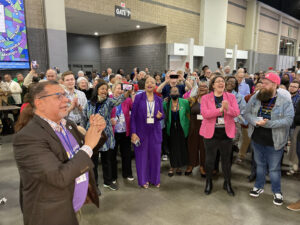
WASHINGTON (BP)–The Southern Baptist Ethics & Religious Liberty Commission has asked the U.S. Supreme Court to uphold an Arizona program that allows tax credits for scholarship donations contributed to religious organizations.
In a case the high court is expected to consider in its next term, the Ethics & Religious Liberty Commission (ERLC) urged the justices in a friend-of-the-court brief to reverse the Ninth Circuit Court of Appeals’ 2009 ruling that sections of the school-choice program violated the First Amendment’s ban on government establishment of religion. The National Association of Evangelicals and the Convocation of Anglicans in North America joined the ERLC on the brief.
No date has been set for oral arguments in the case, but the justices announced in May they would review the Ninth Circuit’s opinion. The high court’s new term begins in October.
The case stems from a 1997 Arizona law that enables citizens to receive income tax credits for donations to private nonprofit “student tuition organizations” (STOs). According to The Arizona Republic, the program “gives donors a dollar-for-dollar reduction in state income taxes for annual contributions of up to $1,000” made to the student tuition organizations, which then “collect the money and distribute it in the form of scholarships.”
According to the Ninth Circuit, based in San Francisco, the two largest STOs are, in order, the Catholic Tuition Organization of the Diocese of Phoenix and the Arizona Christian School Tuition Organization, which limits scholarships to use at evangelical Christian schools.
In the brief, the ERLC and its allies argued the Ninth Circuit failed to follow Supreme Court precedent on school choice and that the court’s approach “undermines rather than protects First Amendment values like governmental neutrality, private choice and free exercise [of religion].”
In overruling the lower court, the Ninth Circuit’s three-judge panel said the program “lacks religious neutrality and true private choice,” but the ERLC brief said the judges “substituted neutrality of outcome for governmental neutrality.”
In seeking to “guarantee a religiously neutral outcome,” the Ninth Circuit panel read the establishment clause to require “governmental non-neutrality, compelling the government to search out and eliminate downstream private choices that favor religion,” the brief said.
“[T]o guarantee a neutral outcome, the government would have to manipulate, coerce and cajole private choice,” according to the brief.
If the Ninth Circuit’s ruling were to stand, its application in the future “will replace governmental neutrality with hostility towards religion,” the brief said.
The ERLC brief also argued the Arizona law provides more protection for both taxpayers and religious institutions than does a Cleveland, Ohio, voucher program upheld by the Supreme Court in a 2002 decision. In the Zelman v. Simmons-Harris opinion, the late Chief Justice William Rehnquist said the Cleveland program “is entirely neutral with respect to religion” and “does not offend” the establishment clause.
The Cleveland program permits a family to use a voucher of as much as $2,250 in state funds for tuition cost at the secular or religious private school of its choice.
The Alliance Defense Fund (ADF) appealed the Ninth Circuit opinion to the Supreme Court on behalf of the Arizona Christian School Tuition Organization. The high court not only granted the request for review from ADF but one from the state of Arizona as well. The cases — Arizona Christian School Tuition Organization v. Winn and Garriott v. Winn — have been consolidated for the justices’ review.
Kelly Shackelford, president of Liberty Institute, is the counsel of record on the brief, which was filed Aug. 6. Liberty Institute is based in Plano, Texas, and seeks to defend constitutional freedoms and strengthen families.
–30–
Compiled by Tom Strode, Washington bureau chief for Baptist Press.















